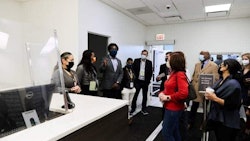
The Illinois Supreme Court has denied a request from a cannabis company to allow the state to name the winners of craft grow licenses that have been held up until pending litigation is settled, according to the Chicago Tribune.
One of the applicants for the craft grow licenses, 1837 Craft Grow LLC, had asked the court to modify an order from a lower court that bars state officials from naming the licensees until litigation is settled.
The case holding up the licenses centers on 13 companies that sued the state to challenge the licensing process after their applications for craft grow licenses were disqualified.
A state law required Illinois officials to issue 60 new craft grow licenses by Dec. 21, 2021, but Cook County Judge Neil Cohen and Sangamon County Judge Gail Noll have ordered that the licenses cannot be issued until the lawsuit is settled.
A hearing in the case is scheduled for March 10.
In the meantime, the Illinois attorney general’s office asked Noll to allow the state to name the 60 winners of the craft grow licenses without officially issuing the licenses in an effort to allow the licensees to move forward with their businesses plans, but Noll denied the request.
“From the very beginning of the cannabis legalization and licensing process, the administration has prioritized clarity and an ongoing commitment to establishing an industry that is accessible to Illinoisans of all backgrounds,” Charity Greene, a spokeswoman for Gov. J.B. Pritzker’s office, told the Chicago Tribune. “We will continue to work with applicants, stakeholders, and our partners in the judicial system to achieve that goal.”
Earlier this month, Irina Dashevsky and Ryan Holz, partners in Greenspoon Marder’s Cannabis Law Practice who are working on the case, detailed the losses that the craft grow applicants are facing as they wait to hear whether they are among the 60 who will ultimately be awarded a license.
RELATED: No End in Sight? Illinois Craft Grow Applicants Wait in Limbo as Litigation Drags On
Applicants are spending hundreds of thousands of dollars in rent payments, losing contracts with experts they had lined up to help run their businesses, and losing investor commitment now that the Dec. 21 licensing deadline has come and gone, the attorneys told Cannabis Business Times.
“I think the biggest issue is there’s a social equity component to this,” Dashevsky said. “Most of these license winners, both on the craft grow and on the dispensary side, are social equity applicants. That was Illinois’ way of trying to diversify the program and get more folks involved. It was supposed to be relatively small businesses, so they just can’t bleed like that."






















